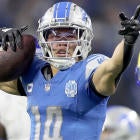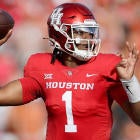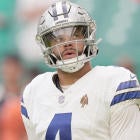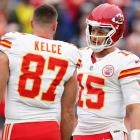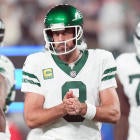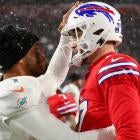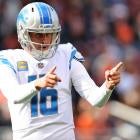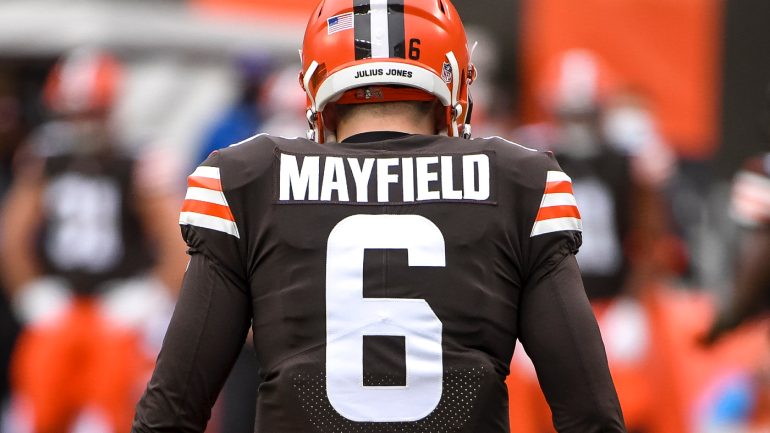
Baker Mayfield bounced back in 2020 after a down second season in the NFL, and, after two decades of scouring, it appears the Browns finally have an intelligent, cohesive coaching staff and front office steering the ship in Cleveland.
With the fate of the Browns firmly in Mayfield's hands, let's explore everything about his environment and what he needs to do to take another step as a quarterback.
Previous installments in this young QB outlook project: Joe Burrow, Tua Tagovailoa, Justin Herbert, Kyler Murray, Drew Lock, Daniel Jones.
How Mayfield has improved since he was a prospect
These positive developments in a quarterback's game are noteworthy because they indicate the distinct possibility of future growth.
Here's a snippet of what I wrote about Mayfield before the 2018 NFL Draft, and my pro comparison for him was Case Keenum:
The Mayfield and Keenum stories are fascinating and extremely telling as to the current state of the NFL and the direction in which offenses are headed. Keenum had a ridiculously productive collegiate career in Houston's spread, pass-happy, shotgun-only offense from 2007 to 2011. The 6-foot-1, 208-pounder exhibited decent athleticism and fine touch downfield. He consistently found open targets quickly and hit them accurately ... then went undrafted. At a similar size, with a similar collegiate career and similar strengths, Mayfield is likely to be selected in the top 10 -- or top 6 -- in the most-hyped quarterback class in 35 years. Mayfield has a stronger arm than Keenum, but the now Broncos signal-caller showed elite-level pocket drifting in 2017 during a career year in which he was one of the most efficient passers in football. Mayfield flashed pocket-drifting skills but does drop his eyes while under pressure more often than you'd like from an early first-round selection.
Mayfield finished with the sixth-highest grade in my season-long evaluation of all the plays of first- and second-year quarterbacks (out of 17 who played) in 2019. Mayfield never received an "A" grade all season but had just one "D+."
In last year's season outlook piece on Mayfield, I wrote this as a summary: "He should post better numbers than he did a season ago, yet, right now, I'm not predicting a true breakout season. One similar to -- and a bit better -- than his rookie campaign seems most likely." And that's essentially what happened. I got a prediction right?!
From his 2019 figures, Mayfield's completion percentage and touchdown rate improved in 2020 while his interception and sack rates dipped. Plus, he set a career-high 95.9 passer rating -- which is a tick higher than the league average of 93.6. Was he miles better in Year 3 than Year 2? Not necessarily. But it was a season-long performance that gave the Browns more confidence in the quarterback position than they've had in a long time.
Trapasso joined Will Brinson on the Pick Six Podcast to talk about what young QBs must do to take the next step; give it a listen below and be sure to follow on your favorite podcast platform.
Supporting cast
Browns GM Andrew Berry has constructed a sturdy foundation around Mayfield, which was needed after a disappointing Year 2 for the No. 1 overall selection in 2018 draft. And the basis of that strong foundation is Cleveland's offensive line.
For as much as I believe quality pass-catching options are critical for young quarterback development, if the blocking is subpar, the efficiency of the passing offense is very likely to be suboptimal. There's a much stronger likelihood a team can field a respectable offense with an upper-level offensive line and average receivers than upper-level receivers but an average offensive line. Here's a telling statistic for more context on this theory of blocking importance -- in 2020, the league average passer rating was 103.7 from a clean pocket and 65.0 when the quarterback was pressured. Massive disparity.
And Cleveland's offensive line is elite. From left tackle to right tackle, it's basically the envy of the entire league.
In the regular season, Mayfield was only pressured on 26.4% of his snaps, the seventh-lowest rate in the league out of 39 qualified passers.
At receiver, the Browns have good featured pieces in Jarvis Landry and Odell Beckham Jr. Rashard Higgins has proven to be the reliable No. 3 everyone wants on their team. The tight-end trio of Austin Hooper, Harrison Bryant, and David Njoku is one of the deepest in the league. Rookie third-round pick Anthony Schwartz adds a speed element alongside Donovan Peoples-Jones.
Before I forget -- Nick Chubb and Kareem Hunt are the best backfield tandem in football. Nice luxury to have.
Scheme
The scheme in Cleveland run by head coach Kevin Stefanski is almost as vital as the blockers. Almost. Nothing is more critical than players in the NFL.
Stefanski operates a wide-zone based blocking scheme and, much like Sean McVay and Kyle Shanahan, he tries to make run/play-action plays look identical to the ground attack to keep the defense guessing. He was integral in calming Mayfield in Year 3 by providing him defined looks from clean or moving pockets. And play-action was a staple.
Mayfield was one of 11 quarterbacks to have a play-action fake built into at least 30% of his drop backs last season.
Improving his weaknesses
Mayfield, especially late in the season and into the playoffs, didn't have noticeable weaknesses as a passer. And at every level of the field, his statistics were slightly above league average.
The "weakness" for Mayfield isn't even his fault. He's just incredibly insulated in this offense. Here's the first line in Mayfield's report in Pro Football Focus' QB Annual on his 2020 season -- "Mayfield was the most protected quarterback in the league in terms of how many non-play-action, non-RPO, non-screen, non-rollout drop backs he had to make last year."
His 67 designed rollouts were tied with Patrick Mahomes for the second-most in football, behind only Jared Goff.
And all of it worked. The Browns finished with the 10th-highest Football Outsiders pass offense DVOA in 2020. Stefanski's system has withstood the test of time. It can elevate quarterbacks. Cleveland is going to be one of the league's better offenses in 2021.
The negative connotation surrounding the term "game-manager" has mostly gone by the wayside. But I still have a sliver of concern about Mayfield in a heavyweight bout with Patrick Mahomes and the Chiefs or Josh Allen and the Bills -- quarterbacks who certainly play in awesome environments but themselves can boost those around them with regular demonstrations of supreme athleticism and arm talent.
Can Mayfield do that in critical situations?
Strengthening his strengths
Mayfield got comfy in Stefanski's scheme last season and operated it like a charm. He was also pinpoint accurate down the field, although that isn't a major element of the offense. His on-target rate was 52% on throws made 20 or more yards downfield. The league average was 42%.
Beyond the deep touch, Mayfield's strengths were that he was "good" across the board. And in Stefanski's system, that's all that needs to be done for a team to move it efficiently down the field, particularly given the bulldozing nature of the offensive line and the presence of an elite feature back in Chubb and a dynamic backup in Hunt.
Season outlook
The general takeaways from the "improving his weaknesses" and "strengthening his strengths" subheadings have created a conundrum. We know a (moderately talented) quarterback living completely inside the structure of a Shanahan-McVay-Stefanski system typically yields desired results. His team will win games. And based on the mini revitalization Mayfield had in 2020 in Stefanski's first season as coach in Cleveland, it's crucial for Mayfield to stay the course in regards to steering the offense.
But here's the Catch-22 -- Mayfield will probably have to eventually rise above the system to make big plays off-script. And I'm just not sure he has the inherent athleticism to do that. He's absolutely flourished in awesome environments -- see: Oklahoma from 2015-2017 -- due to on-field smarts and pinpoint accuracy.
However, Allen, Mahomes, and Lamar Jackson are noticeably more naturally talented, and those are the likely hurdles in front of the Browns and a Super Bowl appearance.
And this is the exact worry I had a season ago. From last year's piece: "Despite an environment unquestionably more conducive to quarterback success than a season ago, I still have legitimate concerns about Mayfield dealing with pressure and the moments in which his average-at-best athleticism for the position hinders his true play-making ability when things aren't perfect."
In 2021, the Browns will be major contenders in the AFC. And Mayfield will produce at a reasonably high level running this phenomenal system that features a nice collection of very good football players. However, in the season's most critical moments, I'm still not convinced he will be able to out-duel the elite quarterbacks in the NFL.














